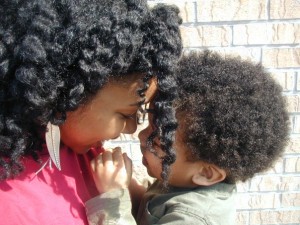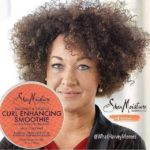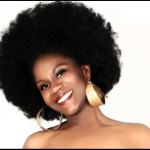“Mommy, your hair is so fluffy,” my son said as he buried his face in my Afro. Taking a deep breath he dug his four-year-old fingers closer to my scalp and exclaimed “I love your hair. It’s so soft!”
It was one of those moments that first time mothers savor for a lifetime.
My husband and I have one son – and while we debate having more – I pretty much gave up on the idea of having a daughter. Statistically speaking, there has not been a female child born in my husband’s family for the past 5 generations. So the odds are fairly high that our next child will also be a boy.
As a long-term naturalista, I sometimes wish for the ability to style a little girl’s hair in big poofs and puffs. When I shop for my own hair products, I frequently catch myself looking at barrettes and clips that are more appropriate for little girls who are too young to understand the “politics” of liking things like the color pink, rainbows and unicorns.
But with a house full of masculine energy, there isn’t a lot of room for mother-child hair bonding. At least, that is what I believed until that little “fluffy hair” exchange with my son.
Until that point, I wasn’t really sure how my son thought about my hair. He always follows Daddy’s lead and says something like “mommy you look pretty today.” But recently he started commenting on my hair in his own words.
A few weeks after that first incident, he pointed out a woman who also wore her hair natural and yelled out “Mommy! She looks just like you!” The woman and I exchanged smiles as he gave me a hi-five.
“What makes you think she looks like me?” I asked.
“She has fluffy hair like you do.” He replied.
“Hmm,” I said, “What do you think of her hair?”
His answer was simple: “I like it. It’s pretty. Can we go to the playground?”
Nothing could have erased the smile from my face. Not that he would have noticed it – he was already running towards the monkey bars.
Yes, he made me smile because mommies always love it when our kids compliment us – either directly or indirectly. But I also felt a seed of excitement because this exchange with him made me realize that being a nappy head is not just important for Black girls – it is also very important for Black boys.
Even in this age of “gender equality” – we still tend to think in gender specific terms. When we talk about the impact of absentee fathers – we often think in terms of how that absence impacts boys without diving into how that absence shapes the lives of girls. When we talk about natural hair – even though Black women and men grapple with preconceived notions about nappiness and what it means for the concept of Black “beauty” – we typically frame the conversation in terms of how natural hair shapes a girl’s perspective without considering how ideas about nappiness shape a boy’s views on the issue.
It is important that we understand that presenting affirming images of natural hair is important for children of both genders. As a little girl – I needed to see depictions of Black women who embraced themselves just as they were. I needed to see depictions of sistas who understood that they were beautiful – and that their nappy hair was a part of that beauty – and not something that detracted from it. I needed this because I was growing up in a world where the beauty of Black women, and the “appropriateness” of our nappy hair, were constantly in question.
My son has never seen me with straight hair. He thinks mommy is beautiful and he loves mommy’s hair simply because he loves mommy. Since he is so young – it isn’t really practical to have an intellectually stimulating conversation with him about the politics of nappiness. But I know that I can create a world for him where he doesn’t have to question the inherent beauty of Black women.
By ensuring he is surrounded by pictures of Black women and nappy hair – my husband and I are able to help shape his view of Black womanhood in particular and Black beauty in general, in a way that would have been a challenge just a generation ago. His baseline premise is that Black women with nappy hair are a beautiful norm – that is his foundation. With a strong foundation my hope is that no matter who else he chooses to see or define as beautiful – he will not have to question whether or not women who look like his mommy can fit into that definition.
As a mom of a Black boy, I now understand that it is not enough for Black girls to learn how to love puffy Afros or two-strand twists. The natural hair movement may be a fairly abrupt one if the males in our community are still allowed to grow up in a world were Black women have to be “straight” in order to be beautiful. The movement will fall short of its potential if we do not also create a revolution in the way Black males are trained to see Black females and if Black boys never see images of Black women as beautiful just the way God made us.
My son will (prayerfully) grow up with a foundation that sees the beauty in his people – first. As opposed to feeling like Black hair is a deficit – he will be raised in a home where Black hair is an asset, an empowering, beautiful, kinky, nappy asset. I can only hope that this will alleviate some of the stigma of Blackness he will encounter in his life.
Here’s to keeping hope alive.





What a beautiful blog Lurie. You have a beautiful family, your son is adorable. It is absolutely true that we have to include men in this conversation.
Mireille – many, many thanks. That means a lot coming from you!
Thank you for posting this. This is a beautiful example of how we need to love ourselves in order for our children to love themselves. Too many of us treat our natural hair as a curse and in doing so we give our children the impression that God created them inadequately and that our only options are perms and weaves. Just as racist parents teach their children to be racist, too often Black women teach their children to hate their natural hair. Stop the hate! Start by loving yourself!
THIS!!! “Too many of us treat our natural hair as a curse and in doing so we give our children the impression that God created them inadequately and that our only options are perms and weaves.”
An Excellent point!
I love your story made me proud to be natural …and teaching our young boys to love natural hair is so great
Thanks Lynn!